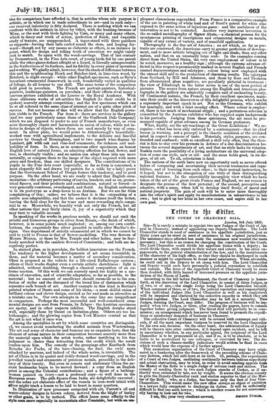!din hr t E tititur.
THE COURT 03 CHANCERY BILL.
London, 9th July 1851.
Sin—It is surely a mistake to appoint two new Judges of the Court of Ap- peal in Chancery, instead of appointing. one Deputy-Chancellor. The Lord Chancellor stands in need of assistance in his appellate jurisdiction, just as thirty years ago he stood in need of assistance m his original jurisdiction. The assistance since afforded has made the assistance now wanted the more necessary; but this is no reason for changing the constitution of the Court. The Lord Chancellor could divide his appellate duties with a deputy; he could divide them, with regard to their nature and extent, to his other en- gagements, to the general administration of the law, and to the maintenance of the character of his high office, so that they should be discharged in such manner as might by experience be found most satisfactory. When advisable, he could call in the Deputy to sit along with him. The Lord. Chancellor and Deputy would each have personally a judicial reputation to establish and sustain. The force of the Appellate Court of Chancery would be more than doubled, with little hazard of Increased pressure on the appellate juris- diction of the House of Lords.
According to the bill before Parliament, the Court of Chancery is beams forth, at the discretion of the Lord Chancellor, to consist of three Judges, or of two, or of one,—the single Judge being the Lord Chancellor himself. When composed of three, or of two the judicial reputation and responsibility of the individual Judges (the Lord Chancellor as well as his coadjutors) will be impaired and obscured by the collective capacity in which they are blended together. The Lord Chancellor may be left in a minority. Two Judges, forming the Court, may differ. The progress of business will be Mae peded when two Judges, or three, after reading the mere, have to consult together before giving judgment. The Great Seal will partially be in com- mission ; an arrangement which has never been found to promote the expedi- tious or satisfactory despatch of business in Chancery.
The collective Court of Chancery will be covered with contempt and ridi. cule if all the most important business be reserved by the Lord Chancellor for his own sole decision. On. the other hand, the administration of Equity will be thrown into utter confusion, if it depend upon accident, and be left in uncertainty whether, in any particular appeal, the judgment of the Lord Chancellor is to be pronounced at all, and it so, is to be absolute, or to be liable to be neutralized by one colleague, or overruled by two. The de- cisions of such a chance-medley judicature would seldom be final in cases which would bear the expense of a. further appeal. This anomalous organization of the Court of Chancery may have origio nated in a hankering after the framework of the preceding scheme of Chan- cery Reform, which fell still-born at its birth. Or, perhaps, the experiment of a Court of two Judges, oscillatil continually betweentedious superfluity and actual-obstruction, may be tri in order to avoid sending appeals from the Master of the Rolls to a single udge of inferior rank and station. The remedy of sending them to two such Judges smacks of Cooker, as if au- thority were estimated by tale, not by weight. It seems the obvious remedy to give the Deputy-Chancellor rank and station superior to that of the Mas- ter-of the Rolls; who, as a Judge, has become only the first of four Vico. Chancellors. This would make the new office always an object of ambition to a lawyer fully competent to discharge its. duties. It will be sufficiently difficultio find one such lawyer; which is another reason for not unnecessa- rily having to look oat for two. I ant, Sir; y,nur very obedient servant, Mucus Cuuum


























 Previous page
Previous page